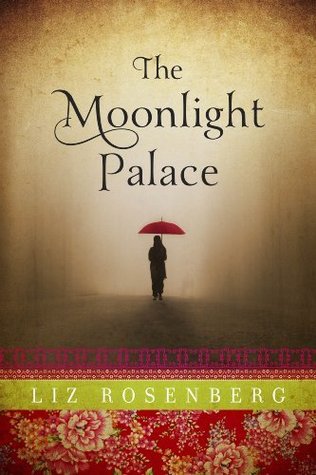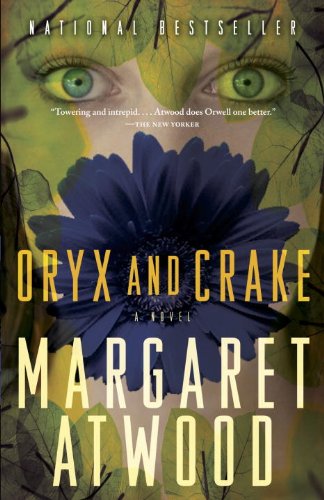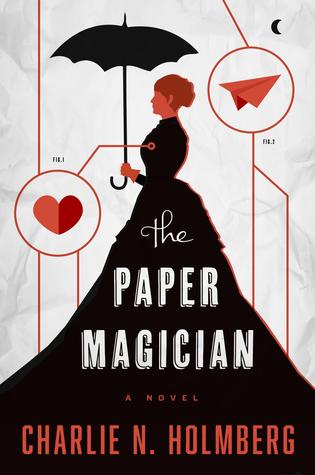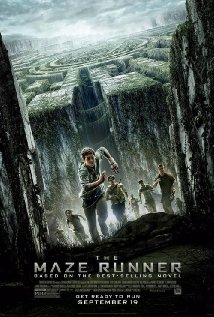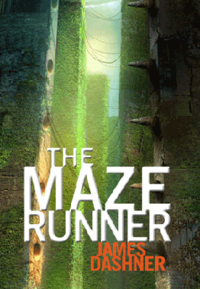I'm a fan of historical fiction and book deals, so when Liz Rosenberg's The Moonlight Palace popped up on my Amazon recommendations - I bought it. I actually ended up getting a discounted Audible version of the story as well and started listening to it on my daily commute. I really enjoyed listening to a professional narration with correct annunciation and the performance of accents - it really brought the story to life in my mind.
The Moonlight Palace is narrated by a teenager by the name of Agnes "Aggie" Hussein. Aggie lives in Singapore in the 1920's in a dilapidated palace called the Kampong Glam. The Hussein family was once a kind of royalty and the palace was once an opulent relic handed to her family in exchange for the family handing Singapore over to the British. Now the family lives in poverty, the palace is in ruins, and Aggie is facing the very real possibility that she may lose her family home; a home that is ingrained in her blood.
Wednesday, December 31, 2014
Monday, December 22, 2014
Book Review: "Slaughterhouse-Five" by Kurt Vonnegut
I've been trying to catch up on some of the classics I never read in school, and Slaughterhouse-Five is one of those books. I'm actually glad I didn't read this in high school, because I wouldn't have been able to comprehend all of its themes. Part autobiography, part absurd, part satire, part science fiction and part war drama - this isn't a story that fits neatly into any specific genre. I can imagine that the first mention of Billy Pilgrim coming unstuck in time and his alien abduction by the Tralfamadorians would cause some readers to close the book and push it away. However, it is this plot aspect that not only functions as an example of Billy's war warped mind, but also as a narrative tool used by Vonnegut to tell a non-linear story.
The narrator of the story is Kurt Vonnegut, he doesn't call himself Kurt Vonnegut, but after listening to an interview with him, I can say with authority that the narrator is a man writing a story about a man writing a story about the WWII massacre at Dresden (very postmodern meta-fiction). The frame story is told in first person perspective and introduces us to the historical event that was the fire bombing of Dresden, Germany. The narrator/Vonnegut talks about how hard it has been to write a story about Dresden, "because there is nothing intelligent to say about a massacre." So what follows is Vonnegut's disjointed tale of Billy Pilgrim that doesn't feel disjointed at all, but rather a well composed and complete story that isn't told in chronological order. You have to be a really good writer to pull off this kind of story telling and make your reader feel like the story couldn't have been told any other way, despite the absurdity of it all.
Monday, December 15, 2014
Book Review: "The Paying Guests" by Sarah Waters
There was once a time when I despised British Literature. I declared my track in college as "Contemporary American Literature," and left the likes of Tristam Shandy and Pamela in my dust. I appreciated the Romantic and the Gothic era, but I still preferred American Lit. However, I really love what's coming from British writers these days. Kate Atkinson's Life After Life, pushed me into a new reading pool that I absolutely adore, and Sarah Waters has now deepened my affection.
The Paying Guests takes place in London in 1922. Anything written between 1900-1945 already has my attention because I'm fascinated by this time in History. London is still in tatters after the first World War, veterans are broken men with menial prospects, and once prominent families face the reality of their wavering wealth. Frances Wray lives in the upper-class neighborhood of Champion Hill, only with the loss of her two brothers in the war and her father to bad health, she and her mother are left with a large old house they can't afford and a former lifestyle they can't maintain. The Wrays lost their wealth due to bad investments and now must take on "paying guests" to stay afloat.
Tuesday, December 2, 2014
Book Review: "Wild" by Cheryl Strayed
There's something about the vulnerability inherent in the art of memoir that makes reading them an exploration of the human condition. My exposure to memoir has been limited, but every time one of these stories lands on my reading list I know I am in for a special kind of journey. Cheryl Strayed's Wild: From Lost to Found on the Pacific Crest Trail is a gritty and honest reflection of the author's months log journey by foot across California and into Oregon on the Pacific Crest Trail (PCT).
Strayed took to the trail during the great meltdown of her life. Her mother died from cancer at the age of 45 which sent her into a grief driven downward spiral resulting in cheating on her husband, a heartbreaking divorce and a heroin addiction. All of this is revealed to the reader in flashbacks as Strayed makes progress on the trail. Strayed's prose is deliberate and clear, which makes following this clueless 26-year-old on a dangerous solo journey through the pacific wilderness a little less infuriating than if she attempted to sugar coat all of her reckless decisions.
Wednesday, November 5, 2014
Book Review: "Oryx and Crake" by Margaret Atwood
Oryx and Crake is set in the future and follows a man who goes by the name of Snowman who may just be be the last human alive. Snowman lives as a kind of guardian of the Crakers, a genetically modified humanoid species that he has liberated from their life in a dwindling habitat under a great dome of biological experimentation. As we follow Snowman's (Jimmy's) depressing daily routine and slow starvation we are introduced to his back story, and hence the back story of this broken world. The structure of the story clips back and forth between the story of Jimmy's childhood and early adulthood and Snowman's journey into wild territory to forage for survival supplies.
Some readers may not like the back and forth structure, but the sections flow seamlessly into one another. The pace is aided by this structure and is relentless in the unfolding of the greater story. Atwood excels in making Jimmy a well realized character with a childhood spent living in corporate science established compounds. These compounds are the gated communities of the elite set apart from the pleeblands where the general population resides. Such social stratification already exists in many ways, so Atwood is merely enhancing the nightmarish possibilities that could emerge from unchecked biological science and corporate influence.
Thursday, October 23, 2014
Book Review: "The Paper Magician" by Charlie N. Holmberg
Charlie N. Holmberg's debut novel, The Paper Magician, is the first installment in a series that I will definitely continue to read due to its undeniable charm. Harry Potter fans will likely enjoy this story for its glimpses of another structured magical world, and fans of Erin Morgenstern's The Night Circus will enjoy the whimsical romance element. The ease of read makes this a quick getaway when compared to something complex in terms of language like Susanna Clarke's Jonathan Strange & Mr. Norrell. So if you're looking for a story with some unique magic, romantic gestures, and the inherent darkness that accompanies power all steeped in a yet to be fully explored magical world, then this could be your next read.
Ceony Twill makes a compelling heroine in the story, showing up at Paper Magician Emery Thane's house to pursue an apprenticeship after graduating top in her class from a magical academy. However, Ceony's not too thrilled to be bonded to the element of paper as it was her dream to work with metal. And here is one of the most interesting parts of this world that begins to unfold: magicians magically bond with a particular object and from there on out their magic is worked through that object. Ceony begrudgingly makes her bond with paper, but her feelings toward folding, which is the paper magician's way of working magic, soon begins to change.
Ceony Twill makes a compelling heroine in the story, showing up at Paper Magician Emery Thane's house to pursue an apprenticeship after graduating top in her class from a magical academy. However, Ceony's not too thrilled to be bonded to the element of paper as it was her dream to work with metal. And here is one of the most interesting parts of this world that begins to unfold: magicians magically bond with a particular object and from there on out their magic is worked through that object. Ceony begrudgingly makes her bond with paper, but her feelings toward folding, which is the paper magician's way of working magic, soon begins to change.
Sunday, October 12, 2014
Book Review: "If I Stay" by Gayle Forman
The experience of what is so commonly referred to as 'coming-of-age' defines a time in life when your decisions carry more weight in designing who you are and who you are becoming. Your parents are no longer the prime decision makers in your life, it is up to you to mold your future - it is the true release of childhood and all the careless freedom it now comes to represent. Gayle Forman's If I Stay is a compelling coming-of-age story embedded in a present moment narrative of unfolding tragedy.
Seventeen-year-old, Mia Hall, wakes up on a snow day from school surrounded by her now-tame punk rock parents, that sound a bit like Northwestern hipsters, and her adoring younger brother Teddy. It's Mia's senior year of high school and she views her family's warmth and eccentricity as one of the things she will miss most if she ends up going to college at Julliard in a few months. The family decides to take advantage of their stolen day off from the responsibilities of life, like giddy children, and use it to visit with friends and family in their Oregon hometown.
Seventeen-year-old, Mia Hall, wakes up on a snow day from school surrounded by her now-tame punk rock parents, that sound a bit like Northwestern hipsters, and her adoring younger brother Teddy. It's Mia's senior year of high school and she views her family's warmth and eccentricity as one of the things she will miss most if she ends up going to college at Julliard in a few months. The family decides to take advantage of their stolen day off from the responsibilities of life, like giddy children, and use it to visit with friends and family in their Oregon hometown.
Saturday, October 4, 2014
Book vs. Movie "Gone Girl": As Good As The Book
 It's rare that a movie stands up to the experience of a book, it's even more rare when a movie is capable of enhancing the experience of the book to create a truly fulfilling cinematic experience. I found this to be the case with David Fincher's Gone Girl. Gillian Flynn, the author of the best-selling book the movie is based upon (which I reviewed here) wrote the screenplay, so I know that has a lot to do with the success of the adaptation. However, it's what Fincher is able to squeeze out of the material visually that makes this movie something dark, suspenseful and likely to disturb audiences unfamiliar with the original material. Even from the opening credits, the restless pace of flashing locations, with names fading as quickly as they appeared was setting the pace for this twisted and fast moving thriller.
It's rare that a movie stands up to the experience of a book, it's even more rare when a movie is capable of enhancing the experience of the book to create a truly fulfilling cinematic experience. I found this to be the case with David Fincher's Gone Girl. Gillian Flynn, the author of the best-selling book the movie is based upon (which I reviewed here) wrote the screenplay, so I know that has a lot to do with the success of the adaptation. However, it's what Fincher is able to squeeze out of the material visually that makes this movie something dark, suspenseful and likely to disturb audiences unfamiliar with the original material. Even from the opening credits, the restless pace of flashing locations, with names fading as quickly as they appeared was setting the pace for this twisted and fast moving thriller.The film starts out with Nick Dunne, played to smug perfection by Ben Affleck, describing how when he thinks about his wife, he thinks about her head and cracking it open to try to understand what she's thinking. At this movie's core is a dark piece of relationship drama that anyone in a relationship can identify with: can you ever really know the person you are with? Think of all the trust it requires to lay your sleeping bones in bed with someone every night and believe that you know them and the love you share well enough to wake up okay the next day. Relationships often begin with each participant putting their best foot forward, living up to an image of the person they think they should be to keep the other happy. A lot of relationships end on a disastrous note due to this projection of falseness and the eventual discovery of who the person "really is."
Friday, September 26, 2014
Movie vs. Book "The Maze Runner": Action Trumps Heart
By now, I suppose most people are either on the YA train or they don’t give a shit about it. I happen to be on that train, and not only do I inundate my reading repertoire with YA fiction, but I also watch the movies that studios have been popping out to a diminishing demand. Statistics, like hips, don't lie. YA movies, with the exception of The Hunger Games and that long ago saga of glittering vamps, consistently underperform in the box office. However, The Maze Runner actually came out on top at the box office its first weekend with $32.5 million, targeting a mostly male audience.
I’m glad teenagers are reading, and it makes sense that Hollywood would want to tap into the trending dystopian and paranormal fiction that dominates the genre. I mean, we need only look back to the explosion of the Harry Potter universe to understand that there is something magical behind books coming to life on the screen. It’s this adaptation from written story to screen that I want to focus on, because I find the adaptation of works of art through several different mediums absolutely fascinating. What makes the cut in the film? What parts of the story are molded differently to fit a tighter timeline in cinema? What depth from narrative can be portrayed through a well configured scene? What tones and themes can be relayed with nothing more than cinematography and score?
Thursday, September 4, 2014
Book Review: "The Maze Runner" by James Dashner
If you haven't tired of young adults in peril in dystopian worlds, then James Dashner's The Maze Runner may be worth your attention. The book is packed full of action and fast paced turn of events that keep the pages turning. The Maze Runner definitely suffers from characters who are seemingly erratic and inconsistent in their emotional reactions to the events that unfold, and while I'd like to contribute this to the life threatening situations that arise (and hormones), I really felt this issue was embedded in the writing and wasn't true to the characters.
Despite some of these character attribute shortcomings, I was immediately drawn into the plot of the story. We follow the perspective of a teenager named Thomas as he wakes up in an elevator lift with no memory of his personal past. He knows his name and he thinks he knows his intuitive self, but as the lift doors open and he is thrust into a group of sixty teenage boys - his internal propulsion to find out what is going on goes against the society these boys have already constructed.
Despite some of these character attribute shortcomings, I was immediately drawn into the plot of the story. We follow the perspective of a teenager named Thomas as he wakes up in an elevator lift with no memory of his personal past. He knows his name and he thinks he knows his intuitive self, but as the lift doors open and he is thrust into a group of sixty teenage boys - his internal propulsion to find out what is going on goes against the society these boys have already constructed.
Wednesday, August 27, 2014
Book Review: "Fifty Shades of Grey" by E.L. James
The infamous Fifty Shades of Grey. Perhaps it was curiosity or blunt force trauma to the head, but this former Literature major decided to go slumming. My motivation doesn't really matter, what does matter is the fact that not only did I read this book, but I am also reading the second book in the trilogy. My enjoyment of the text has little to do with the quality of writing and everything to do with mindless entertainment. Sometimes you just need an escape, you know, an escape into a virgin's mind when she meets a man of god-like attractiveness who lures her into an erotic sexscape of bondage/discipline, dominance/submission and sadism/masochism (BDSM).
Anastasia Steele is about to graduate from college when she interviews Christian Grey, a young corporate billionaire, as a favor to her journalism savvy roommate, Katherine Kavanagh. If those names make you want to roll your eyes then welcome to my head. Ana is an innocent who has never had a boyfriend, never had sex and never masturbated. Meeting Christian is like flipping a light switch, and suddenly Ana becomes very aware of her own sexuality in proximity to him. Christian, for whatever reason (I suspect virgin radar) is intensely attracted to Ana and commences stalking her. Christian is well aware of his dark and twisted ways and warns Ana that he is dangerous and she should stay away from him, but then he continues to stalk her. Talk about mixed signals.
Wednesday, August 13, 2014
Book Review: "Miss Peregrine's Home for Peculiar Children" by Ransom Riggs
 |
| Photo: Metrokids |
The novel's protagonist, Jacob Portman, is a believable loner who doesn't feel connected to his teenage existence. Jacob's emotional angst isn't foreign to the teenage experience, but Riggs navigates this disconnection between Jacob and his assumed path in life so that the emergence of the peculiar feels like it was lurking there all along.
After propelled into motion by the horrific death of his grandfather, Jacob goes to Whales in an effort to understand his deeply rooted emotional and psychological connection with his grandfather. The inciting incident is well crafted and the trip to Whales feels like a natural choice in trying to introduce Jacob to his grandfather's origins. Jacob's grandfather, Abraham, was sent to an orphanage on the Welsh island from Poland during World War II.
Sunday, August 10, 2014
"The Knick": Uncomfortably Unique
 |
| Photo: Mary Cybulski/HBO/Rolling Stone |
The pilot is perhaps a bit overloaded with turn of the 20th century references which feels a bit like an Upton Sinclair and Jacob Riis mash-up at moments. However, all of the right production elements come into play to make this pilot episode, Method and Madness, a captivating hour of television.
Monday, July 21, 2014
Book Review: "Gone Girl" by Gillian Flynn
.jpg) I haven't read a mystery/thriller novel in ten years. Why? Well, even before I got wrapped up in the demands of my Literature degree I had gone off mystery stories for one main reason: predictability. I found the plots were no longer able to sustain my interest because the structure felt formulaic. I openly admit that I was probably reading only a fragment of good mystery writing available, but that was my experience.
I haven't read a mystery/thriller novel in ten years. Why? Well, even before I got wrapped up in the demands of my Literature degree I had gone off mystery stories for one main reason: predictability. I found the plots were no longer able to sustain my interest because the structure felt formulaic. I openly admit that I was probably reading only a fragment of good mystery writing available, but that was my experience.So when I heard about Gillian Flynn's Gone Girl, I had my reservations. However, like so many of my recent book choices - I saw that the movie was coming out and I wanted to hop on that pop culture wave. Let me just say - I'm really glad I did. I can honestly say that I haven't felt shamelessly hooked to a book the way I was to Gone Girl in a long time. I'm talking sneak-reading while I'm supposed to be getting ready to go out with friends; wondering what these characters were up to while I was at work. The entire journey felt justified...until the last couple of pages.
Thursday, July 10, 2014
Book Review: "The Leftovers" by Tom Perrotta
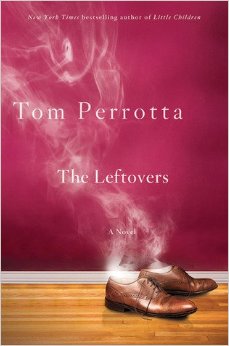 I wanted to read this book before the HBO series based on
Tom Perrotta’s dystopian novel premiered, and I finished a mere two hours shy of the deadline. (If you’re watching the show, you can check out my reviews of each episode here: www.hobotrashcan.com.)
Okay, back to the book. I was intrigued by this idea of 2% of the world’s
population vanishing with no explanation. What happens to those who are left
behind? What happens to societal structure and the role of religion beneath the weight of the unknown?
I wanted to read this book before the HBO series based on
Tom Perrotta’s dystopian novel premiered, and I finished a mere two hours shy of the deadline. (If you’re watching the show, you can check out my reviews of each episode here: www.hobotrashcan.com.)
Okay, back to the book. I was intrigued by this idea of 2% of the world’s
population vanishing with no explanation. What happens to those who are left
behind? What happens to societal structure and the role of religion beneath the weight of the unknown? The story picks up three years after the "Sudden Departure" of 2% of the world's population. In the story we get to travel into different character perspectives to gain a wider scope of the impact of the Sudden Departure. Most of the characters we follow are from the Garvey family. Kevin Garvey is the Mayor of Mapleton, which serves as a microcosm for what is occurring on a world wide scale. Kevin is struggling with raising his teenage daughter Jill in the aftermath of all that has happened. Jill is trying to make sense of a world with an uncertain future, as is much of the youth in the story. All of the previous societal expectations seem absurd when you don’t know if tomorrow is guaranteed. Jill’s perspective provides a glimpse into her broken world filled with hedonism and a slow growing discovery that not even extreme explorations of pain and pleasure can fill the void.
Wednesday, May 28, 2014
10 Quotes from Writers about Books
I came across these quotes today on a blog I follow and had
to re-blog them here because I write a lot about books I've read. I am of the
opinion that the bond between writers and books is a very unique one. What
writer have you ever known who didn't read? Books influence our ability to be
creative and imagine entire worlds inside our minds, and I am always trying to
put the worlds I create inside my mind down on paper. It’s a natural bond and
cycle of influence for writers who are readers. In a world that is filled
with status updates and tweets that make us limit our words - these quotes are
reminder of the life changing journey that can occur by simply reading a book. Today
we lost a very important writer of our time, Maya Angelou, and so I would like
to add a quote to this list in her honor:
Any
book that helps a child form a habit of reading, to make reading one of his
deep and continuing needs, is good for him. – Maya Angelou
Wednesday, April 16, 2014
Book Review: "The Fault in Our Stars" by John Green
 When I decided to read The Fault in Our Stars, I was coming off a reading hiatus. You know that empty space between books that no book seems capable of filling? I was stuck there in the thick of the reading hiatus malaise. Then, thanks to an Entertainment Weekly subscription I received for Christmas, I read there was a movie coming out based on the Young Adult book, The Fault in Our Stars. And of course there was one of those BuzzFeed lists that told me what I should read before the movie comes along. One can argue that reading a book first can ruin a film experience, but more often than not I find that having read the book enhances my viewing pleasure, because I know more of the story than the medium of film can portray.
When I decided to read The Fault in Our Stars, I was coming off a reading hiatus. You know that empty space between books that no book seems capable of filling? I was stuck there in the thick of the reading hiatus malaise. Then, thanks to an Entertainment Weekly subscription I received for Christmas, I read there was a movie coming out based on the Young Adult book, The Fault in Our Stars. And of course there was one of those BuzzFeed lists that told me what I should read before the movie comes along. One can argue that reading a book first can ruin a film experience, but more often than not I find that having read the book enhances my viewing pleasure, because I know more of the story than the medium of film can portray.
While the book falls into the Young Adult genre, the intellectual complexity of the novel really surprised me. John Green is not a man who writes lightly. There's nothing I love more than being completely surprised by a story. References to Kierkegaard, T.S. Eliot and William Carlos Williams elevates this epic cancer romance. An epic cancer romance sounds just how it feels while reading it. And if you should endeavor to take this story on then you should know that it possesses the capacity to make you laugh and cry within a three page spread.
Tuesday, February 4, 2014
Harry and Hermione? I'm Not Sold.
If you're a Potter fan you have undoubtedly heard J.K.Rowling's recent interview comments indicating that with the distance from the beloved Harry Potter series she has changed her perspective on their epilogue destinies.
“I wrote the Hermione/Ron relationship as a form of wish fulfillment,” she says. “That’s how it was conceived, really. For reasons that have very little to do with literature and far more to do with me clinging to the plot as I first imagined it, Hermione ended up with Ron.”
Tuesday, January 7, 2014
Book Review: "Love Medicine" by Louise Erdrich
In this beautiful story exploring multiple themes, one of which is modernity vs. tradition,the most pressing theme is the idea of and the boundaries of love. Love is examined through continual intersections of characters in the story and how they are thrown together in fits of desire, passion, desperation and even deep disconnected sorrow. It is a family saga that spans generations (and novels).
Subscribe to:
Posts (Atom)
